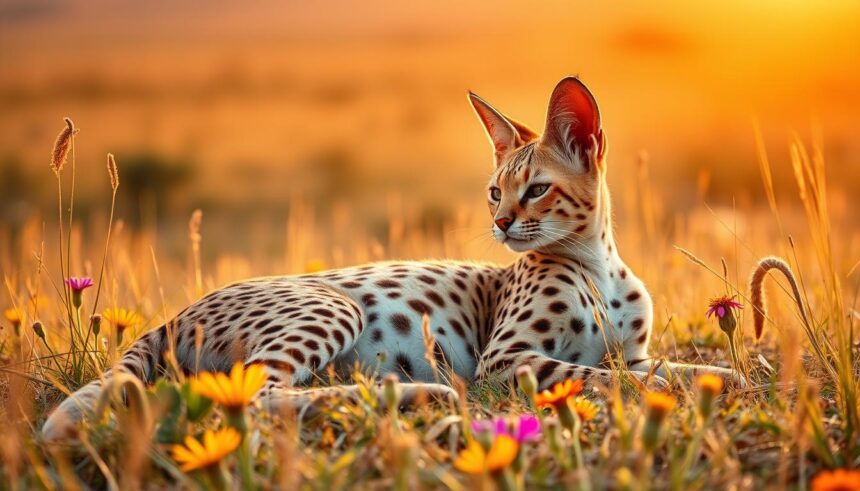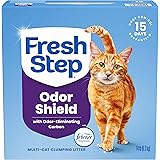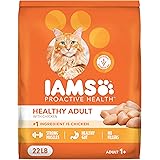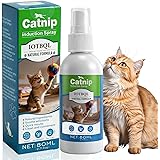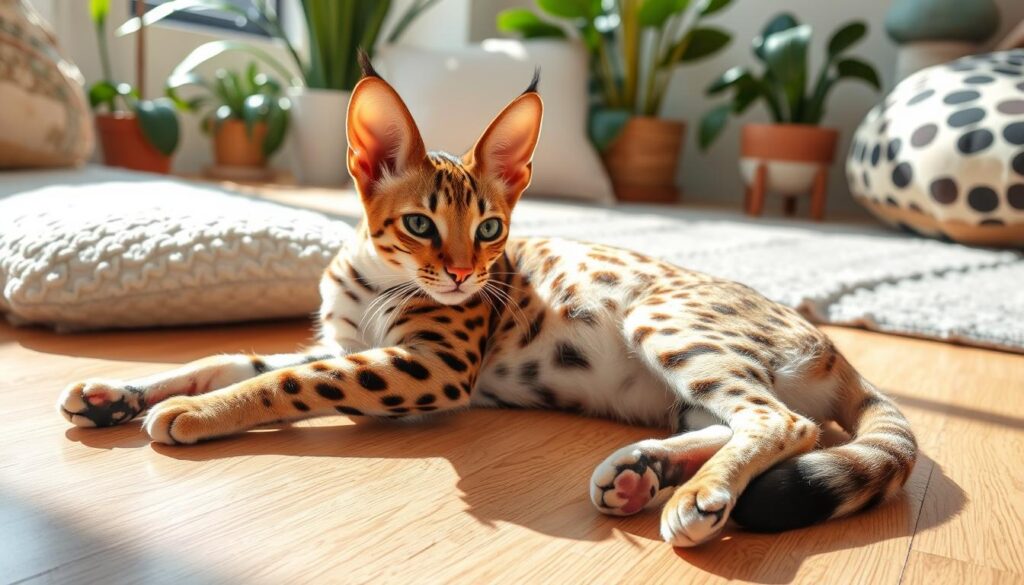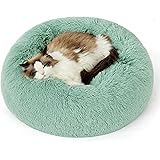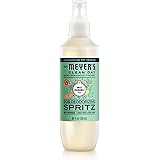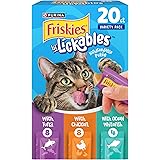Thinking about getting a serval cat? They are a special type of cat from Africa. Known for their unique coat and long legs, they stand out. But, they need special care and have a strong instinct to hunt, which might not fit every home.
Buying a serval cat can cost between $1,000 and $5,000. It’s a big decision.
Key Takeaways
- Serval cats are a type of exotic cat breed native to sub-Saharan Africa
- They have distinctive coat patterns and long legs, making them a unique domestic cat
- Serval cats have specific care requirements and natural hunting instincts
- Prices for serval cats range from $1,000 to $5,000
- Owning a serval cat may require approval from authorities and licensing in different countries
- Serval cats can live up to 20 years in captivity, double the age of their wild relatives
Understanding the Serval Cat Breed
The serval cat is a wild cat from sub-Saharan Africa. It’s often mixed up with the Savannah cat, a hybrid. To get to know the serval cat, we need to learn about its origins, looks, and how it acts. Serval cats have a special coat and long legs, making them stand out as a domestic cat option.
A key difference between serval and Savannah cats is their background. Savannah cats are a mix of a serval and a domestic cat. Serval cats, on the other hand, are pure African wild cats. Knowing this helps us understand their needs and personalities. Serval cats need a big outdoor space and a diet that fits their nutritional needs.
Fumoi Automatic Cat Litter Box Self Cleaning Litter Box Large Capacity for Multiple Cats, App Control with Safety Sensors, Removable Washable Liner,2 Rolls Garbage Bags,Grey
$199.97 (as of February 17, 2026 07:33 GMT +00:00 – More infoProduct prices and availability are accurate as of the date/time indicated and are subject to change. Any price and availability information displayed on [relevant Amazon Site(s), as applicable] at the time of purchase will apply to the purchase of this product.)INABA Churu Cat Treats, Grain-Free, Lickable, Squeezable Creamy Purée Cat Treat/Topper with Vitamin E & Taurine, 0.5 Ounces Each Tube, 50 Tubes, Tuna & Chicken Variety
$32.99 (as of February 17, 2026 07:24 GMT +00:00 – More infoProduct prices and availability are accurate as of the date/time indicated and are subject to change. Any price and availability information displayed on [relevant Amazon Site(s), as applicable] at the time of purchase will apply to the purchase of this product.)Majestic Pet 4 Step Portable Dog Stairs for Small Dogs to get on Bed Supports 250 lbs or Less – Dog Steps for High Bed with Machine Washable Cover –Pet Stairs for Cats Links Gray
$66.99 (as of February 17, 2026 07:52 GMT +00:00 – More infoProduct prices and availability are accurate as of the date/time indicated and are subject to change. Any price and availability information displayed on [relevant Amazon Site(s), as applicable] at the time of purchase will apply to the purchase of this product.)Blue Buffalo Bursts Crunchy & Creamy Cat Treats, Great for Training, Paw-Lickin’ Chicken, 5-oz Bag
$2.98 (as of February 17, 2026 07:33 GMT +00:00 – More infoProduct prices and availability are accurate as of the date/time indicated and are subject to change. Any price and availability information displayed on [relevant Amazon Site(s), as applicable] at the time of purchase will apply to the purchase of this product.)Self Warming Cat Bed Self Heating Cat Dog Mat 24 x 18 inch Extra Warm Thermal Pet Pad for Indoor Outdoor Pets with Removable Cover Non-Slip Bottom Washable Non Electric
$19.77 (as of February 17, 2026 07:33 GMT +00:00 – More infoProduct prices and availability are accurate as of the date/time indicated and are subject to change. Any price and availability information displayed on [relevant Amazon Site(s), as applicable] at the time of purchase will apply to the purchase of this product.)ARM & HAMMER Clump & Seal SLIDE Platinum Multi-Cat Clumping Cat Litter, 14-Day Odor Control, EZ Clean Technology, 18 lbs – No Scrubbing, Powerful Odor Eliminator
$17.99 (as of February 17, 2026 07:24 GMT +00:00 – More infoProduct prices and availability are accurate as of the date/time indicated and are subject to change. Any price and availability information displayed on [relevant Amazon Site(s), as applicable] at the time of purchase will apply to the purchase of this product.)Bedsure Calming Dog Bed Medium Size Dog – Donut Washable Medium Pet Bed, 30 inches Anti-Slip Round Fluffy Plush Faux Fur Cat Bed, Fits up to 45 lbs Pets, Camel
$39.99 (as of February 17, 2026 07:24 GMT +00:00 – More infoProduct prices and availability are accurate as of the date/time indicated and are subject to change. Any price and availability information displayed on [relevant Amazon Site(s), as applicable] at the time of purchase will apply to the purchase of this product.)Hdwk&Hped Soft Cotton Dog Pajamas for All Seasons, Striped Solid Pet Bottoming Jumpsuit for Small Dog Cat Puppy 3 Styles (Striped Style – 3-Pack, #4)
$20.99 (as of February 17, 2026 07:52 GMT +00:00 – More infoProduct prices and availability are accurate as of the date/time indicated and are subject to change. Any price and availability information displayed on [relevant Amazon Site(s), as applicable] at the time of purchase will apply to the purchase of this product.)Fresh Step Clumping Cat Litter, Multi-Cat, Long Lasting Odor Control Kitty Litter with Activated Charcoal, Low Dust Formula, 14 lb
$9.54 (as of February 17, 2026 07:24 GMT +00:00 – More infoProduct prices and availability are accurate as of the date/time indicated and are subject to change. Any price and availability information displayed on [relevant Amazon Site(s), as applicable] at the time of purchase will apply to the purchase of this product.)Purina Friskies Wet Cat Food Variety Pack, Shreds With Beef, Turkey and Cheese Dinner, Chicken and Salmon Dinner, and With Ocean Whitefish and Tuna – (Pack of 40) 5.5 oz. Cans
$32.76 (as of February 17, 2026 07:33 GMT +00:00 – More infoProduct prices and availability are accurate as of the date/time indicated and are subject to change. Any price and availability information displayed on [relevant Amazon Site(s), as applicable] at the time of purchase will apply to the purchase of this product.)Serval cats can jump up to 10 feet to catch prey. They like to be alone and need lots of space to move around. In the wild, they mark their territory with feces and saliva. As a unique pet, serval cats can be wonderful companions for those who can meet their needs.
Serval cats are considered “Least Concern” in terms of conservation. However, owning one requires special licenses and permits in most places. With the right care and socialization, serval cats can live up to 20 years and bond strongly with their owners. Whether you’re drawn to a wild cat hybrid or a purebred African wild cat, understanding their needs is key.
The Cost of Owning a Serval Cat
Thinking about getting a serval cat? The price can be steep, ranging from $1,000 to $5,000. Owning a serval cat comes with big expenses. Monthly costs for food, vet visits, and keeping their enclosure clean can be $500 to $1,000.
Some might ask, can a serval cat hurt a human? While serval cats are wild and should be respected, attacks on people are rare. It’s key to know what serval cats need before bringing one home. The cost of a serval cat is just the start. Food, vet bills, and supplies add up fast.
There’s more to owning a serval cat than the initial cost. You’ll need to budget for food, vet care, and keeping their enclosure safe and comfy. A good diet, regular vet visits, and a secure home are vital for a serval cat’s health. Doing your homework helps you decide if a serval cat is right for you.
Here are some estimated costs to consider:
- Initial purchase price: $1,000 to $5,000
- Monthly costs: $500 to $1,000
- Food and supplies: $200 to $500 per month
- Veterinary care: $500 to $1,000 per year
Serval Cats vs Savannah Cats: Key Differences
Many people ask if Savannah cats make good pets. To understand this, we must look at the differences between Serval cats and Savannah cats. Serval cats are purebred and have a wild nature. Savannah cats, on the other hand, are a mix of a serval and a domestic cat. They are known for their unique looks and personality.
IAMS Proactive Health Adult Healthy Dry Cat Food with Chicken, 22 lb. Bag
$39.98 (as of February 17, 2026 07:33 GMT +00:00 – More infoProduct prices and availability are accurate as of the date/time indicated and are subject to change. Any price and availability information displayed on [relevant Amazon Site(s), as applicable] at the time of purchase will apply to the purchase of this product.)IOTBQL Premium Catnip Spray for Cats – 100% Natural Ingredients, Boosts Energy,Relieves Stress – Renews Toys, Reduces Scratching, Easy-to-Use & Mess-Free 2.71 Fl OZ (Blue-Green, M)
$14.99 (as of February 17, 2026 07:33 GMT +00:00 – More infoProduct prices and availability are accurate as of the date/time indicated and are subject to change. Any price and availability information displayed on [relevant Amazon Site(s), as applicable] at the time of purchase will apply to the purchase of this product.)Purina Fancy Feast Gravy Lovers Poultry and Beef Grilled Gourmet Wet Cat Food Variety Pack – (Pack of 24) 3 oz. Cans
$22.86 (as of February 17, 2026 07:25 GMT +00:00 – More infoProduct prices and availability are accurate as of the date/time indicated and are subject to change. Any price and availability information displayed on [relevant Amazon Site(s), as applicable] at the time of purchase will apply to the purchase of this product.)WORLD’S BEST CAT LITTER Multiple Cat Unscented, 32-Pounds – Natural Ingredients, Quick Clumping, Flushable, 99% Dust Free & Made in USA – Long-Lasting Odor Control & Easy Scooping
$39.94 (as of February 17, 2026 07:52 GMT +00:00 – More infoProduct prices and availability are accurate as of the date/time indicated and are subject to change. Any price and availability information displayed on [relevant Amazon Site(s), as applicable] at the time of purchase will apply to the purchase of this product.)Purina Tidy Cats Free and Clean Unscented Cat Litter – 38 lb. Box
$29.20 (as of February 17, 2026 07:33 GMT +00:00 – More infoProduct prices and availability are accurate as of the date/time indicated and are subject to change. Any price and availability information displayed on [relevant Amazon Site(s), as applicable] at the time of purchase will apply to the purchase of this product.)Fancy Feast Poultry and Beef Feast Classic Pate Collection Grain Free Wet Cat Food Variety Pack – (Pack of 30) 3 oz. Cans
$28.06 (as of February 17, 2026 07:33 GMT +00:00 – More infoProduct prices and availability are accurate as of the date/time indicated and are subject to change. Any price and availability information displayed on [relevant Amazon Site(s), as applicable] at the time of purchase will apply to the purchase of this product.)Temptations Creamy Puree Squeezable Lickable Cat Treats, Wet Cat Treats with Chicken, Salmon, and Tuna Variety Pack, 0.42 oz. Tubes, 24 Count
$13.28 (as of February 17, 2026 07:33 GMT +00:00 – More infoProduct prices and availability are accurate as of the date/time indicated and are subject to change. Any price and availability information displayed on [relevant Amazon Site(s), as applicable] at the time of purchase will apply to the purchase of this product.)Bonkers Bites CAT Treats Catnip, Chick’N & Cheddar 30 OZ
$12.97 (as of February 17, 2026 07:33 GMT +00:00 – More infoProduct prices and availability are accurate as of the date/time indicated and are subject to change. Any price and availability information displayed on [relevant Amazon Site(s), as applicable] at the time of purchase will apply to the purchase of this product.)Dr. Elsey’s Ultra UnScented Clumping Clay Cat Litter 40 lb. Bag
$22.99 (as of February 17, 2026 07:25 GMT +00:00 – More infoProduct prices and availability are accurate as of the date/time indicated and are subject to change. Any price and availability information displayed on [relevant Amazon Site(s), as applicable] at the time of purchase will apply to the purchase of this product.)Cat Hairball Support Chews – 500 Crunchy & Creamy Texture Hairball Treats for Cats – Texture Indoor Feline Digestion Formula, Hairball Control & Cat Digestion Support, Chicken & Krill Flavor
$20.99 (as of February 17, 2026 07:52 GMT +00:00 – More infoProduct prices and availability are accurate as of the date/time indicated and are subject to change. Any price and availability information displayed on [relevant Amazon Site(s), as applicable] at the time of purchase will apply to the purchase of this product.)Savannah cats look more like domestic cats, while Serval cats have a wilder look. The mix of a serval and a domestic cat created Savannah cats. They can be great pets for those who are experienced. But, it’s important to remember that they need special care.
Appearance Comparisons
Savannah cats have big ears, long bodies, wide noses, and special coat patterns. Serval cats, however, have a more striking look. They are taller and more muscular.
Temperament Variations
Savannah cats are more loving and social. Serval cats are independent and not as affectionate. This difference is key when choosing a pet. Savannah cats are more friendly, thanks to their mix with domestic cats.
| Generation | Serval Genetics | Weight |
|---|---|---|
| F1 | 57% | 9.9-24.3 lb |
| F2 | 35% | 7.7-18.1 lb |
| F3 | 21% | 3.5-8.2 lb |
Legal Considerations for Serval Ownership
Thinking about getting an african serval cat breed? You must know the legal side. Laws about owning a serval cat differ by state and country. It’s key to check the laws in your area. Some places, like California and New York, don’t allow exotic pets, including african serval cat breeders and exotic cat breed.
In the U.S., seven states let people own serval cats without a permit. These are Illinois, Michigan, Montana, North Carolina, South Carolina, Tennessee, and West Virginia. But, other states need a permit or license. Always check with local authorities about african serval breed laws.
Here is a list of states with specific laws and regulations regarding serval cat ownership:
- States that allow ownership without a permit: Illinois, Michigan, Montana, North Carolina, South Carolina, Tennessee, and West Virginia
- States that require a permit: Arkansas, Florida, Idaho, Indiana, Kansas, Kentucky, Maine, Mississippi, Missouri, Nevada, North Dakota, Oklahoma, Pennsylvania, South Dakota, Washington, Wisconsin, and Wyoming
- States where ownership is prohibited: Alaska, Arizona, California, Colorado, Delaware, Hawaii, Massachusetts, New Jersey, New York, and others
Owning a serval cat is a big deal. It’s not just about the animal; it’s about the responsibility. Serval cats are wild and need special care. Before getting one, make sure you know the laws and can give them the right care.

- 🐱 【Multifunctional Activity Center】The cat Tree provides 3 top perches platforms and two cozy condo. Whether your kitten wants to stretch out on a spacious perch, curl up in a plush hole room, or release the urge to scratch on a sisal pole, this multifunctional cat tree tower works perfectly as a recreation paradise,which can make your fur baby's day full of fun and excitement!two toys gives them a unique way and Fun to play!
- 🐱【 Large Space Vertical】Because of its compact footprint and ability to conserve floor space, the cat tree design offers a large amount of vertical space. Every cat can have their own zone thanks to the cat jumping platform, which is another way that modern cat trees promote indoor cat peace. Maximum Load Capacity: 44 lbs. If your cat is too big for this cat tree, please buy one for tiny and medium-sized cats!
- 🐱 【Stable Construction】Our Cat Tower is made of high-quality particle board with skin friendly plushy faux-fur cover to keep your cat warm and comfortable. The cat activity tree has a wall anchor strap which provides a good double security protection. You don't have to worry that the cat tree will overturn or shake accidentally.Give your cat the best protection!ideal for average kittens and cats.
- 🐱 【Posts for Scratching Covered in Sisal 】These are scratching surfaces that are integrated into the framework. Cats love to bury their claws in sisal because it's a sturdy substance with a coarse texture. Our cat tree promotes healthy scratching habits and helps discourage cats from damaging furniture by offering dedicated spaces for them to scratch.
- 🐱 【Simple assembly】We understand that convenience is important to pet owners, which is why we made our cat tree simple to assemble in a matter of minutes. You can quickly provide your kitties a stimulating environment by following the simple setup instructions and using the available tools. Please feel free to contact us with any questions you may have about our cat tree, and we will respond to you within a day!

- Teething Fun: Ideal for kittens and cats alike, these chew toys are an essential addition to your kitty’s dental care. With natural gall fruit and rope design, the toys are perfect for teething and teeth cleaning, they combat tartar and freshen breath, making dental hygiene a fun activity for your little one!
- Infused with Catnip Aroma: The included catnip bag emits a soothing aroma that's irresistible to felines, ensuring these toys are a calming and engaging presence for indoor play. Our cat toys provide the calming, meow-inducing fun every kitten craves, along with a funny and interactive experience.
- Energetic Exercise: Promote healthy exercise and self-play with our toys' appealing textures and tassels. They’re designed to entice your kitty to bite and play aggressively without harm, offering hours of exercise and self-amusement, keeping your cat active and happy.
- Quiet Play: These soft colorful ropes provide enriching quiet playtime without bothering cat owner's sleep or life. Your kitty will love the funny snake-like shapes, enhancing their playtime with every pounce and bite.
- Safe and Organic: These chew toys, handcrafted without any metal wire and using organic cotton rope, are safe for all cats. Paired with a reusable catnip bag, they’re an essential, eco-friendly addition to your cat’s enrichment collection.

- MADE WITH WHOLESOME INGREDIENTS YOU CAN TRUST: Every Inaba product is made with yummy ingredients including farm-raised chicken and/or wild-caught tuna
- KEEP OUR FELINE HYDRATED WITHOUT ADDING CALORIES: Each delicious, creamy Churu tube contains 91% moisture and only 6 calories (a tenth of the calories of traditional dry cat treats), which makes it a healthy snack you can feel good about feeding
- FREE OF THE BAD STUFF: Your feline friend is important to us, which is why we've kept things like grains, preservatives, artificial colors and carrageenan out of our cat treats, but we added things like Vitamin E for immunity
- HAVE THEM EATING OUT OF YOUR HAND: These lickable purée meat tubes for cats were designed to be fed by hand, as an interactive way to spend time with your feline, but you can use as a wet/dry cat food topper or as a way to disguise medication
- ADD SOME VARIETY TO YOUR CAT'S LIFE: Available in eleven savory flavors, cats of all stages (kitten to senior) will be able to find a flavor they love

- FREEZE-DRIED RAW MINNOWS CAT TREAT: Vital Essentials Freeze Dried Cat Treats pack more protein than industry standard into every bite to deliver the peak vitality your dog deserves. Our natural freeze-dried raw cat treats are made from responsibly sourced premium minnows.
- BETTER PROTEIN = BETTER BENEFITS: The best freeze dried cat treats on the market use premium butcher cut raw protein to unlock the benefits of naturally occurring vitamins and minerals in raw muscle and organs, because pets deserve the energetic playtimes, healthy skin, shiny coats, strong teeth, and essential gut health that a high-protein diet delivers.
- PROUDLY AMERICAN CRAFTED: All our cat treats and food are responsibly sourced and humanely harvested to ensure the quality of our proteins. We go above industry standards to preserve flavor and ensure the highest quality of protein and nutrients in every Vital Essentials product.
- MADE WITHOUT: Cat treat additives, fillers, dyes, flavorings, artificial preservatives, grains, or rendered by-products. Vital Essentials also offers the widest variety of single-protein raw cat food and treats on the market—great for picky eaters and cats with allergies!
- RAW CAT TREATS FREEZE DRIED FOR PEAK FRESHNESS: Our protein is frozen within 45-minutes of harvesting to lock in peak nutrients, flavor, and freshness. A slow-freeze-dry ensures minimal processing, while preserving the vital nutrients that our pets deserve, the way nature intended.

- Cats Lose Their Cool: Just shake the pack, and your favorite feline will come running for their favorite cat treats
- Purr-fect Texture: Cat treats are crunchy on the outside and soft on the inside, making it the cat snack that keeps them coming back
- Under 2 Calories Per Treat: Each cat treat is under 2 calories, so these little crunchy goodies make the perfect snack or reward that can be given daily
- Trifecta of Tempting Cat Treats: Catnip Fever is a delicious cat snack with a mix of chicken, catnip, and cheese flavors your cat will love
- Value-Sized, Resealable Tub: Treat ’em again and again using the resealable tub that is perfect for keeping cat paws off when you’re not watching

- Award-Winning Product. Veken is proud to be a 2024 Category Winner of the Pet Innovation Awards, an honor given to only the most forward-thinking products within the rapidly expanding Pet industry.
- Upgraded Stainless Steel. Opt for a stronger, more hygienic version of our best selling pet fountain. Easy to clean and BPA-free, our stainless steel design offers the elevated and modern look you want with additional benefits.
- Large Capacity Water Tank. Worry less about your furry friend running out of water. Our pet fountain features a generously sized water reserve tank to help you avoid frequent refilling, ensuring your pets are healthy, hydrated, and happy.
- Advanced 5-Stage Filtration. Our upgraded system with silver, scale inhibitors, and activated carbon delivers fresh, clean water for up to 3 weeks. For optimal performance and your pet’s health, we recommend using softened or filtered water.
- LED Light Feature. Illuminate your pet’s favorite drinking spot with our optional on/off light feature. Designed for assisted visibility of water level and fountain location, our gentle light is perfect for avoiding spills and easy refilling.

- 4-in-1 Monitoring Tools: Sealed, hygienic strips for comprehensive cat wellness indicator checks.
- Simple At-Home Use: User-friendly steps with clear guidance—no professional training needed.
- Quick Readings: Obtain consistent readings at home in 10-20 minutes to stay attentive to your cat’s needs.
- Gentle and Non-Intrusive: Designed for minimal stress, using easy sample collection (feces/swabs) suitable for cats.
- Hygienic Components: Individually sealed tools and pre-measured solution for clean, safe use at home.

- 【Interactive Cat Toys】High quality aluminum alloy shell which equipped with metal clip design and three adjustment modes, only need to slide adjustment, no need to long press,in addition,Interactive cat toys mini size and easy to carry, easily put this cat toys in your pocket or bag, use it anytime and anywhere for added.
- 【7 In 1 Modes】This cat toys has 5 patterns: red dot, mice, butterfly, smile face, star. Scoll the black gear on the head to change to 3 different modes: red, purple, white. You can use the purple to check couterfeit currency and check your pets. White mode can be used for emergency lighting. The red mode can be used to play with your cat or for PowerPoint presentation.
- 【Indoor Play】Excellent interactive cat toys can not only bring endless fun, but also exercise the pet's body and agility.Can provide exercise and endless fun,This exercise chaser toy can satisfy the curiosity and playfulness of your cat.
- 【USB Direct Charging】Unplug the back cover and connect the charging head to charge it. It does not need dry battery and is environmentally friendly.
- 【Gifts for Your Pets】With this cat toys, your pet will not feel lonely, but also can enhance the relationship between you and your pet, It's the best gift for pets.

- Unique and Funny Design: These cute plush cat toys are designed to look like knives, creating a hilarious contrast with your kitty's playful nature. Perfect for indoor play, they will bring endless amusement to both you and your cat.
- Multiple Attractions: Filled with organic catnip and silvervine, these toys make cats excited and playful. The crinkle paper inside adds an extra layer of fun, making engaging sounds that entice your kitty to play and exercise.
- High-Quality and Safe: Made from durable materials, these toys are designed to withstand biting and clawing. The high-quality catnip is sun-dried and packaged in a non-woven bag, ensuring a long-lasting, refreshing scent that keeps your cat coming back for more.
- Interactive and Engaging: These toys provide great enrichment for your cat's life, promoting exercise and interactive play. The crinkle sound and realistic design keep your kitty engaged and stimulated, preventing boredom and promoting healthy activity.
- Calming and Cuddly: Perfect for self-play and calming your cat, these plush toys are soft and safe for your kitty to cuddle and bite. The combination of catnip and silvervine provides a soothing effect, making them an essential addition to your cat's toy collection.

- Friskies Prime Filets wet cat food made with real meat, poultry or seafood. Savory sauce or gravy for cats adds flavor and moisture
- Shredded soft cat food chunks offer a tempting texture. Provides 100 percent complete and balanced nutrition for adult cats
- Multi-can Friskies canned cat food variety pack makes it easy to stock your pantry. Contains essential vitamins and minerals in every serving
- Enticing, moist cat food aroma tempts her to her dish. Checked for quality and safety to provide added peace of mind
- Canned cat food variety pack formulated to meet or exceed industry standards for cat food
Living with a Serval: Housing Requirements
Thinking about getting a serval cat? It’s key to consider their housing needs. A serval cat breeder can offer great advice. They need a big outdoor area, at least 36 square feet, for exercise and fun.
In Canada, serval cat breeders canada suggest enclosures that are 8 feet tall. This lets them jump and climb. In Texas, serval cat breeders texas say to add platforms and perches. This helps them act naturally.
For your serval’s happiness, a safe outdoor space is vital. They need clean water and a healthy diet always. Talking to a good serval cat breeder helps you understand their special needs.
Diet and Nutrition for Serval Cats
It’s very important to give a serval cat the right food for its health. They need a diet rich in protein, with a mix of meat and veggies. Learning about serval cat care helps owners know why a balanced diet is key. A good cat food can be made better with fresh meat and veggies, fitting their needs.
Some key things to think about for serval cat nutrition include:
- High-protein diet with a mix of meat and vegetables
- Supplementation with fresh meat and vegetables
- Avoiding low-quality fillers and by-products
It’s essential to note that serval cats have unique dietary needs. Owners should talk to a vet or animal nutritionist to find the best diet. Serval cats are big, weighing 20 to 40 pounds, and need lots of exercise, which affects their diet.
Guidelines say a raw diet is good for servals, with 80% muscle meat, 10% non weight-bearing bone, 5% offal, and 5% liver. Diets like Mazuri small exotic feline diet and ZuPreem exotic feline diet are also good. Knowing about serval cat characteristics and facts helps owners care for their pets better.
For more info on serval cat care and nutrition, visit catsjoys.com. There, owners can learn more about caring for their pets, including serval cat characteristics and facts.
| Dietary Component | Percentage |
|---|---|
| Muscle Meat | 80% |
| Non Weight-Bearing Bone | 10% |
| Offal | 5% |
| Liver | 5% |
Serval and Domestic Cat Breeding
Breeding servals with domestic cats is a complex task. It’s mainly because of the welfare of the female domestic cats. They are much smaller than the wild male servals. The offspring, called Savannah cats, are popular pets but raise concerns about wildlife and their behavior.
Some key facts about Savannah cats include:
- They are the result of crossing a domestic cat and a serval, leading to the creation of domestic cats with short spotted coats.
- They are known to enjoy water-related activities, reflecting their serval ancestry that prefers areas close to water bodies.
- They can live for 20 years or more and require special care, including taurine supplements due to their need for higher taurine levels compared to average domestic cats.
The breeding process involves crossing a serval cat with a domestic cat. This creates a hybrid offspring. These kittens are often larger and more exotic-looking. They have a distinctive coat pattern and long legs. The domestic serval cat is a unique house pet that needs special attention and care.
Despite the challenges and concerns, many breeders are dedicated to breeding Savannah cats. The demand for these popular cat breeds continues to grow. It’s important to consider the potential risks and uncertainties involved in breeding and owning a domestic serval cat or a Savannah cat.
| Generation | Characteristics |
|---|---|
| F1 | 50% serval, 50% domestic cat |
| F2 | 25% serval, 75% domestic cat |
| F3 | 12.5% serval, 87.5% domestic cat |
Health Care Requirements and Veterinary Needs
Serval cats, known for their wild looking domestic cats appearance, need regular vet care to stay healthy. As an exotic pet, they require a diet that meets their nutritional needs. Their characteristics of serval cats also mean they face specific health issues. According to pet care experts, they are prone to respiratory problems, skin infections, and parasites.
Preventive care is key to keeping serval cats healthy. This includes regular vet visits, vaccinations, and meds against fleas, heartworms, and parasites.
Some common health issues in serval cats include:
- Progressive retinal atrophy
- Pyruvate kinase disease
- Hypertrophic cardiomyopathy
Regular vet care can spot these issues early. Preventive care can also lower the risk of them happening.
Training and Socialization Guidelines
Training a domesticated serval needs patience and consistency. This unique cat breed requires careful socialization and training. Experts say early socialization and training are key for a well-behaved serval cat.
Positive reinforcement techniques, like clicker training and reward-based training, are essential. They help build trust and encourage good behavior. Remember, serval cats are wild and may not follow traditional training. Owners must be flexible and adapt their training to meet their cat’s needs.
Here are some key considerations for training and socializing a domesticated serval:
- Start socialization and training early to ensure a strong bond between the cat and its owner
- Use positive reinforcement techniques to encourage good behavior
- Be patient and flexible when training, as serval cats can be unpredictable
- Provide plenty of exercise and mental stimulation to keep the cat happy and healthy
By following these guidelines and being committed to providing the necessary care and attention, owners can help their domesticated serval thrive and become a beloved and integral part of the family.
| Training Method | Description |
|---|---|
| Clicker Training | A positive reinforcement technique that uses a clicker to mark good behavior |
| Reward-Based Training | A training approach that uses rewards, such as treats and praise, to encourage good behavior |
Cost Comparison: Servals vs Other Exotic Cats
Thinking about the cost of a serval cat? It’s important to know their size and lifespan. Servals are tall, ranging from 21 to 24 inches, and can weigh 20 to 40 pounds. They can live over 22 years. The cost to buy one can be from $1,000 to $5,000, based on the breeder and location.
Compared to other exotic cats, like Savannah cats, the cost is different. Savannah cats, a mix of domestic and serval cats, can cost over $50,000. This makes them very expensive. Some sources say the first and second generations of Savannah cats are the most expensive.
Initial Purchase Costs
The cost of owning a serval or Savannah cat is high. It’s important to think about all the costs. Here are some key points:
- Initial purchase cost: $1,000 to $5,000 for a serval cat, and over $50,000 for a Savannah cat
- Ongoing maintenance expenses: $500 to $1,000 per month for a serval cat, and similar costs for a Savannah cat
- Food and veterinary care: $1,000 to $2,000 per year for both serval and Savannah cats
Ongoing Maintenance Expenses
There are ongoing costs to consider besides the initial price. These include food, vet bills, and keeping their enclosure clean. With the right care, serval and Savannah cats can live well. But, it’s key to understand the costs and duties of owning these exotic pets.
The Reality of Serval Cat Ownership
Owning a serval cat can be rewarding but comes with challenges. These cats have wild instincts and specific needs. They need a lot of space, attention, and care. Learn more about their needs.
Challenges include mischievous behavior, high energy, and special diets. Understanding these before bringing a serval cat home is key. Proper care and attention are vital for both the cat and the owner.
Despite challenges, many people enjoy owning serval cats. But, knowing your state’s laws on exotic pets is crucial. For example, some states ban owning serval cats due to their wild nature.
To have a successful experience, research the needs and challenges of serval cats. With the right care, they can thrive and be rewarding companions.
| State | Regulations |
|---|---|
| Illinois | Ban on serval cat ownership |
| Other states | Varying regulations |
Alternative Exotic Cat Breeds to Consider
If you’re looking for a unique pet, there are many options besides domesticated servals. The Savannah cat is a mix of a serval and a domestic cat. Exotic cat breeds like Savannahs are recognized by the International Cat Association (TICA). They are known for their unique looks and high energy.
Other exotic cats, like Bengal and Egyptian Mau cats, can also be great pets. They often have special serval cat characteristics, such as unique coat patterns and colors. It’s important to learn about their serval cat care needs to ensure you can meet them.
When choosing an exotic cat, think about their energy levels and playfulness. For example, Savannahs need lots of play and activities. But, cats like Abyssinians or Bombay cats might be more relaxed and need less play.
Choosing an exotic cat is a big decision. It requires careful research and understanding their needs. By looking into different breeds, you can find the perfect pet for you.
Conclusion
Owning a serval cat is rewarding but also challenging. These exotic pets need careful planning, special care, and a deep understanding of their unique cat breed needs. Their captivating looks and agility might attract some, but they are wild animals and not for every home.
Before getting a serval, owners must think about the big space requirements, dietary needs, and safety considerations. Being a responsible exotic pet owner means putting the serval’s health first. This includes making sure their home meets their physical and behavioral needs. With the right research, dedication, and care, a serval can do well in a home.
Deciding to own a serval cat is a big choice. It’s important to understand the challenges and be ready to take on the responsibilities. For those who are committed to the serval’s well-being, it can be a rewarding experience. The serval’s unique qualities and hunting skills make them a special companion. But, they need the utmost care and thought.
What is the Serval Cat Breed?
How much does a Serval Cat cost?
What is the Serval Cat Breed?
How much does a Serval Cat cost?
FAQ
What is the Serval Cat Breed?
The Serval Cat Breed is a unique and exotic feline. It has long legs, a spotted coat, and large ears. However, they are wild animals and may not be good house pets. They have specific care needs and natural hunting instincts.
How much does a Serval Cat cost?
The cost of a serval cat varies. It depends on location, breeder, and bloodline. On average, it can cost between
FAQ
What is the Serval Cat Breed?
The Serval Cat Breed is a unique and exotic feline. It has long legs, a spotted coat, and large ears. However, they are wild animals and may not be good house pets. They have specific care needs and natural hunting instincts.
How much does a Serval Cat cost?
The cost of a serval cat varies. It depends on location, breeder, and bloodline. On average, it can cost between $1,000 to $5,000.
What are the key differences between Serval Cats and Savannah Cats?
Savannah cats are a mix of a serval and a domestic cat. Serval cats are purebred. Savannah cats look more domesticated, while servals look more exotic.
Savannah cats are often more affectionate and social. Serval cats are more independent and aloof.
Is it legal to own a Serval Cat?
Laws about owning a serval cat vary by state and country. It’s important to check the laws in your area. Some places, like California and New York, have strict laws against owning exotic animals, including serval cats.
What are the housing requirements for a Serval Cat?
Serval cats need a large outdoor enclosure. It should be at least 1,000 square feet. The enclosure must be secure and escape-proof.
It should also have toys, scratching posts, and climbing structures. These provide mental and physical stimulation.
What kind of diet does a Serval Cat require?
Serval cats need a high-protein diet. This includes a mix of meat and vegetables. A good quality cat food can be supplemented with fresh meat and vegetables for a balanced diet.
Can Serval Cats breed with domestic cats?
Yes, serval cats can breed with domestic cats. This produces Savannah cats. The breeding process involves crossing a serval cat with a domestic cat.
The resulting kittens are often larger and more exotic-looking. They have a distinctive coat pattern and long legs.
What are the common health issues in Serval Cats?
Serval cats can have respiratory problems, skin infections, and parasites. Regular health care and veterinary attention are crucial for their well-being.
How do you train and socialize a Serval Cat?
Training and socializing a serval cat requires patience and consistency. They are wild animals and may not respond to traditional training methods.
Start socialization and training early. Use positive reinforcement techniques like clicker training and reward-based training.
What are the alternatives to owning a Serval Cat?
If you’re interested in exotic cats, there are alternatives to serval cats. Savannah cats, for example, are a cross between a serval and a domestic cat. They can make unique and exotic companions.
Other exotic cat breeds, like Bengal cats and Egyptian Mau cats, can also provide a distinctive and beautiful companion.
,000 to ,000.
What are the key differences between Serval Cats and Savannah Cats?
Savannah cats are a mix of a serval and a domestic cat. Serval cats are purebred. Savannah cats look more domesticated, while servals look more exotic.
Savannah cats are often more affectionate and social. Serval cats are more independent and aloof.
Is it legal to own a Serval Cat?
Laws about owning a serval cat vary by state and country. It’s important to check the laws in your area. Some places, like California and New York, have strict laws against owning exotic animals, including serval cats.
What are the housing requirements for a Serval Cat?
Serval cats need a large outdoor enclosure. It should be at least 1,000 square feet. The enclosure must be secure and escape-proof.
It should also have toys, scratching posts, and climbing structures. These provide mental and physical stimulation.
What kind of diet does a Serval Cat require?
Serval cats need a high-protein diet. This includes a mix of meat and vegetables. A good quality cat food can be supplemented with fresh meat and vegetables for a balanced diet.
Can Serval Cats breed with domestic cats?
Yes, serval cats can breed with domestic cats. This produces Savannah cats. The breeding process involves crossing a serval cat with a domestic cat.
The resulting kittens are often larger and more exotic-looking. They have a distinctive coat pattern and long legs.
What are the common health issues in Serval Cats?
Serval cats can have respiratory problems, skin infections, and parasites. Regular health care and veterinary attention are crucial for their well-being.
How do you train and socialize a Serval Cat?
Training and socializing a serval cat requires patience and consistency. They are wild animals and may not respond to traditional training methods.
Start socialization and training early. Use positive reinforcement techniques like clicker training and reward-based training.
What are the alternatives to owning a Serval Cat?
If you’re interested in exotic cats, there are alternatives to serval cats. Savannah cats, for example, are a cross between a serval and a domestic cat. They can make unique and exotic companions.
Other exotic cat breeds, like Bengal cats and Egyptian Mau cats, can also provide a distinctive and beautiful companion.


